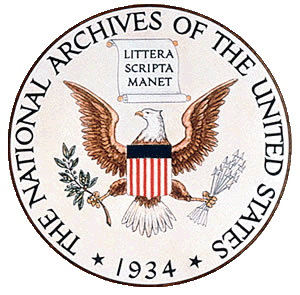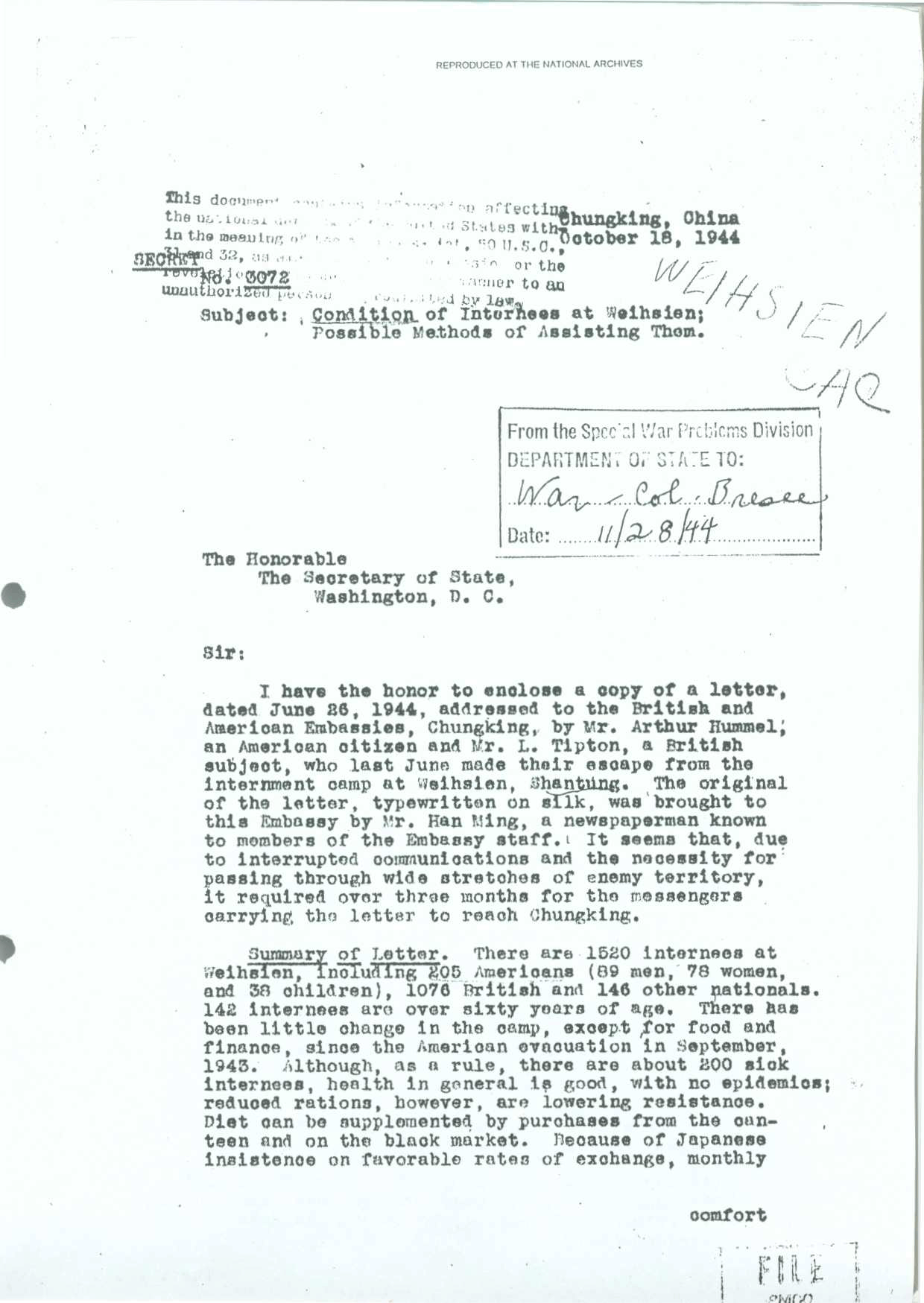
REPRODUCED AT THE NATIONAL ARCHIVES
SECRET
Chungking, China
October 18, 1944.
No. 3072
Subject:
Condition of the Internees at Weihsien; Possible Methods of Assisting them.

Declassified: November 28, 1944
The Honorable
The Secretary of State,
Washington, D. C.
Sir:
I have the honor to enclose a copy of a letter, dated June 26, 1944, addressed to the British and American Embassies, Chungking, by Mr. Arthur Hummel, an American citizen and Mr. L. Tipton, a British subject, who last June made their escape from the internment camp at Weihsien, Shantung. The original of the letter, typewritten on silk was brought to this Embassy by Mr. Han Ming, a newspaperman known to members of the Embassy staff. It seems that, due to interrupted communications and the necessity for passing through wide stretches of enemy territory, it required over three months for the messengers carrying the letter to reach Chungking.
Summary of Letter. There are 1520 internees at Weihsien, including 205 Americans (89 men, 78 women, and 38 children), 1076 British ants 146 other nationals. 142 internees are over sixty years of age. There has been little change in the camp, except for food and finance, since the American evacuation in September, 1943. Although, as a rule, there are about 200 sick internees, health in general is good, with no epidemics; reduced rations, however, are lowering resistance. Diet can be supplemented by purchases from the canteen and on the black market. Because of Japanese insistence on favorable rates of exchange, monthly comfort money payments have ceased. Personal funds in the hands of internees are now largely exhausted. Visits of the Swiss Consul at Tsingtao have become rare due to lack of Japanese cooperation. There has been some anxiety lest a sudden Japanese withdrawal would leave the defenseless internees at the mercy of lawless elements. This anxiety has been allayed by the receipt of an offer of assistance from a Commander Wang who is at the head of a disciplined and largely self-sufficient body of some twenty-five thousand armed men who are independent both of the Communists and the Central Government and are in control of some five or six hsien immediately to the north and east of Weihsien. Two representatives of the internees, Mr. Arthur Hummel (American) and Mr. L. Tipton (British) left the camp secretly in order to establish contact with Commander Wang. It was decided that any effort to evacuate the internees by air would not be feasible but that certain concrete steps could be taken looking toward the betterment of the conditions within the camp, including the following: (1) placing a reliable contact in the camp as an employee of the Japanese; (2) Commander Wang to supply the internees with funds up to FRB$100,000 monthly, the maximum which could be absorbed in the camp without arousing Japanese suspicions, Wang to be reimbursed by means of ammunition a and medicines which could be dropped by parachute at a given area under his control; (3) the anonymous purchase of foodstuffs which might be presented to the Swiss Consul at Tsingtao for transmission to the camp and (4) the stationing near Weihsien of a responsible English-speaking Chinese who could take charge of all matters pertaining to the camp. Messrs. Hummel and Tipton feel that it is time some effort was made to relieve the present situation at Weihsien. End of Summary.
The original of the letter from Messrs. Hummel and Tipton has been retained in the Embassy, copies having been given to the British Embassy and the American military and naval authorities in Chungking. Major F. B. Summers, of the Office of the British Military Attaché at Chungking, has left for Kunming to discuss the matter of the possible relief of the internees at Weihsien with Captain Maxwell Becker, MISX, USAF, CBI, the American Army organization in this theater directly concerned with prisoners of war and civilian internees. While in Kunming, Major Summers will also have the opportunity of discussing the matter with Mr. William B. Christian, formerly representative of American interests in the concentration camp at Weihsien, and now with the Office of Strategic Services. Major Summers has promised, on his return to Chungking, to inform the Embassy of developments.
The Embassy understands that Mr. Hummel is a son of Mr. Arthur Hummel of the Library of Congress (Embassy's airgram A-88, October 9, 12 noon) and that Mr. Tipton is a representative of the British-American Tobacco Company. They were doubtless chosen to represent the internees because they had no relatives in the internment camp who might suffer at the hands of the Japanese as a result of their escape. It appears, from information given by Mr. Li Tzu-lien, the local representative of Commander Wang, that the camp is but lightly held and that Hummel and Tipton were able to make good their escape without difficulty. With regard to the statement made in the letter that radio communication is maintained between Commander Wang's headquarters and Chungking via Fouyang, Anhwei, Mr. Li has informed the Embassy that such is actually not the case at present, due to inadequate and faulty radio equipment at Fouyang.
Respectfully yours,
(Signed) C.E.Gauss
Enclosure:
Letter on conditions at Weihsien Camp dated June 26, 1944.
[click here] 
Ozalid Original to Department
ARR:rcb
711.5





